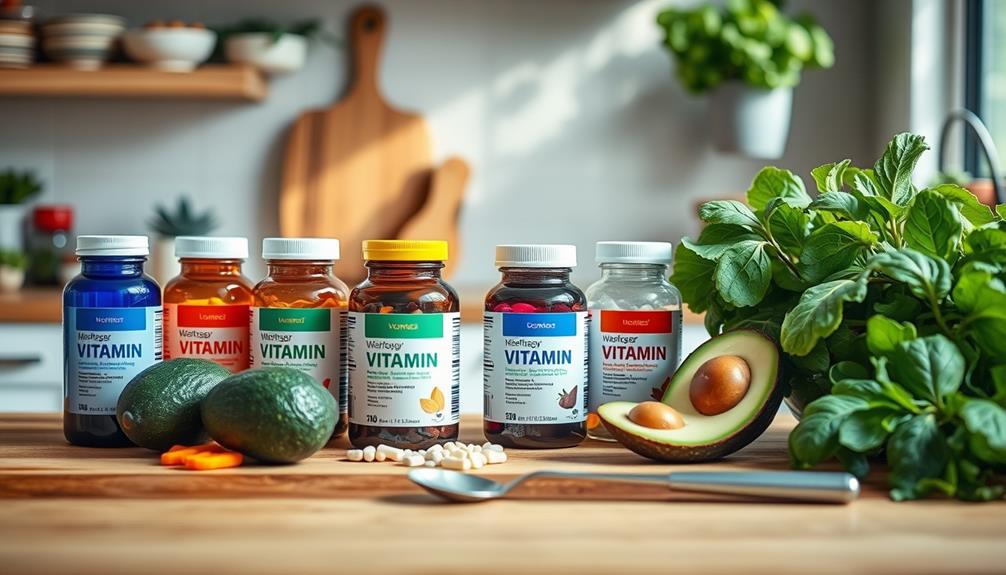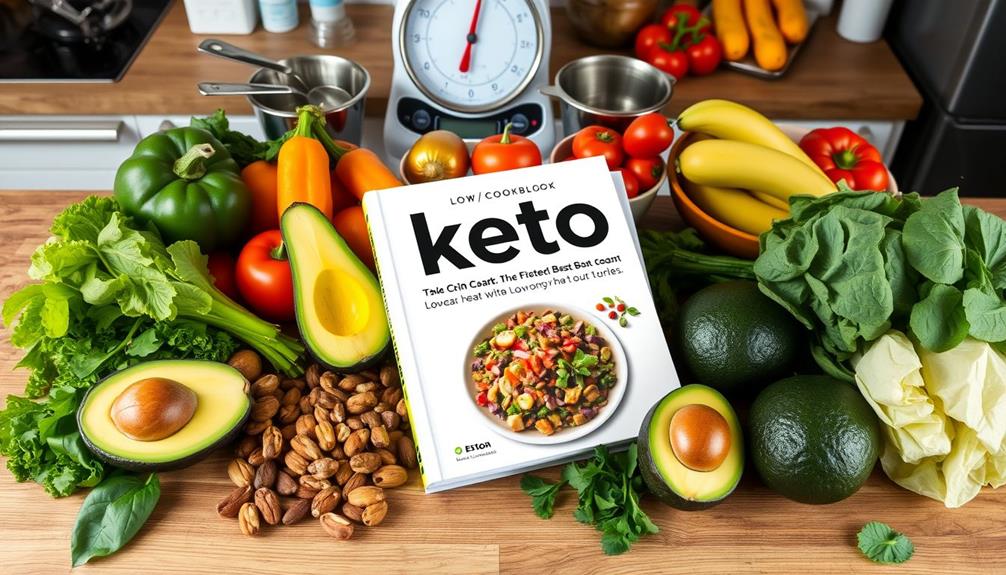To succeed on a keto diet, it's important to focus on key vitamins and minerals. Start with magnesium, which supports energy and muscle function. Don't overlook vitamin D for bone health and immune support. Include calcium to maintain strong bones, and consider potassium to help with muscle function and cramps. B vitamins are essential for energy metabolism, while omega-3 fatty acids promote heart health. Finally, iron is critical for red blood cell production. Choosing the right supplements tailored to your needs can make a difference. So, stick around to discover more about optimizing your keto nutrition! In addition to focusing on key vitamins and minerals, it’s important to incorporate ketofriendly meal ideas that are rich in these essential nutrients. For example, magnesium-rich foods like nuts, seeds, and leafy greens can be included in salads or as snacks. Vitamin D can be obtained from fatty fish such as salmon, while calcium can be found in dairy or dairy alternatives. B vitamins are found in meat, poultry, and eggs, while omega-3 fatty acids are abundant in foods like avocados and olive oil. Incorporating these foods into your keto diet can help ensure you are getting the nutrients you need to thrive.
Key Takeaways
- Magnesium is vital for energy production and muscle function; aim for 200-400 mg daily to alleviate "keto flu" symptoms.
- Calcium supports bone health and muscle contraction; daily intake should be 1,000 mg for adults and 1,200 mg for women over 51.
- Vitamin D is essential for immune function and calcium absorption; aim for 600-800 IU daily and consider regular blood testing for levels.
- Potassium helps regulate muscle function and blood pressure; target a daily intake of 2,500-3,000 mg to prevent cramps.
- Supplement with essential B vitamins to support energy metabolism, especially if food sources are limited on a ketogenic diet.
Importance of Vitamin Supplementation

When diving into the keto diet, it's imperative to keep an eye on your vitamin intake. The restriction of carbohydrate-rich foods can lead to nutrient deficiencies, particularly in magnesium, calcium, and potassium.
These minerals are essential for maintaining overall health, as proper mineral balance can also play a role in gout-friendly diets, so you might want to take into account supplements to fill these gaps in your nutrition.
Vitamin D is another significant nutrient that's often lacking on a keto diet. Limited food options can hinder your calcium absorption and immune function, making vitamin D supplementation indispensable.
Regularly taking a multivitamin can help guarantee you're getting a blend of essential vitamins, including B vitamins, which play a notable role in energy metabolism and overall well-being.
To tailor your vitamin supplementation to your specific dietary needs, consult with a healthcare provider. They can help you monitor for any potential side effects or interactions with other supplements you may be taking.
Essential Vitamins for Keto

The essential vitamins and minerals for a keto diet play a significant role in maintaining your health and well-being. On keto, you need to focus on specific nutrients to support your body's needs.
Magnesium is critical, as it aids over 300 bodily processes, and a daily intake of 200-400 mg can help alleviate muscle cramps and sleep issues. Additionally, incorporating foods rich in antioxidants, such as celery juice, can support your overall health while on the diet.
Calcium is another essential nutrient, important for muscle contraction and bone health. Aim for 1,000-1,200 mg daily from keto-friendly sources like sardines and dark leafy greens.
Vitamin D is key for calcium absorption and immune function; consider supplementation if you're deficient.
Don't overlook potassium, which regulates muscle function and blood pressure. Adults should target around 2,500-3,000 mg daily, especially during the shift to keto, to avoid imbalances.
Finally, omega-3 fatty acids are important for heart health and reducing inflammation. Make sure you get at least 500 mg of combined EPA and DHA daily.
Magnesium and Its Benefits

Magnesium plays an essential role in your overall health, especially on a keto diet. It's vital for more than 300 biochemical processes, including energy production, muscle function, and nerve signaling. If you're experiencing the "keto flu," magnesium can help alleviate symptoms like muscle cramps and fatigue.
To guarantee you're getting enough magnesium, consider incorporating magnesium-rich foods into your diet. Here's a quick overview of some great sources:
| Food | Magnesium Content (mg) | Benefits |
|---|---|---|
| Spinach | 157 | Supports energy levels |
| Almonds | 76 | Helps regulate blood sugar |
| Avocado | 58 | Reduces risk of magnesium deficiency |
| Dark chocolate | 64 | Improves muscle function |
The recommended daily intake is 310-320 mg for women and 400-420 mg for men. A magnesium deficiency can lead to insomnia and increased muscle cramps, affecting your long-term health on the keto diet. So, make sure you're prioritizing magnesium to keep your body functioning at its best!
The Role of Vitamin D

Vitamin D plays a crucial role in supporting your immune function and maintaining strong bones, especially on a keto diet where dairy sources are often limited.
On a ketogenic diet, it's important to verify your body is receiving all necessary nutrients, as restrictive eating can sometimes lead to deficiencies. You mightn't be getting enough vitamin D from your food, which makes supplementation important to meet your needs.
Understanding investment regulations can also play a part in planning for your health expenses.
Let's explore how to guarantee you're getting adequate vitamin D to support your overall health while following a ketogenic lifestyle.
Importance for Immune Function
Strong immune health is essential, especially when following a ketogenic diet. Vitamin D plays a significant role in supporting your immune system by enhancing the pathogen-fighting abilities of monocytes and macrophages, which are critical white blood cells.
Additionally, a balanced diet rich in nutrients can further bolster your immune function, making it important to evaluate effective strategies for weight loss while on keto. A deficiency in vitamin D can markedly increase your risk of respiratory infections and autoimmune diseases, making it even more important to maintain adequate levels while on keto.
The recommended dietary allowance (RDA) for vitamin D is 600 IU (15 mcg) for adults up to age 70 and 800 IU (20 mcg) for those over 70. However, many individuals on a ketogenic diet may need supplementation to reach these levels.
Since vitamin D is fat-soluble, it's best absorbed with dietary fats, aligning perfectly with your high-fat eating plan.
Research suggests that adequate vitamin D levels can improve overall immune function and reduce your risk of infections, especially during winter months when sunlight exposure is limited.
Sources and Supplementation Needs
While maintaining a ketogenic diet, it's essential to take into account your sources of vitamin D, as many common food items that are typically fortified with this important nutrient may not fit into your meal plan.
The recommended daily intake for most adults is 600-800 IU, but you might struggle to meet this through food alone, especially with limited dairy and fortified products. Additionally, incorporating gold IRAs for retirement can provide financial security, allowing you to focus on your health without financial stress.
As a result, regular supplementation becomes important to prevent deficiencies, which can lead to symptoms like fatigue, bone pain, and muscle weakness—issues that could derail your keto lifestyle. To maximize absorption, consider taking your vitamin D supplements with meals rich in healthy fats, as fat-soluble vitamins like D are more effectively utilized in this way.
Additionally, it's wise to monitor your vitamin D levels through regular blood testing. Individual needs can vary greatly based on factors like geography, skin exposure to sunlight, and overall health.
Impact on Bone Health
How does vitamin D influence your bone health on a ketogenic diet? Vitamin D plays an essential role in calcium absorption, which is critical for maintaining strong bones. On a ketogenic diet, you may limit calcium-rich foods like dairy and certain grains, increasing your risk of deficiency. If you're not getting enough vitamin D, your bones could weaken, raising the risk of osteoporosis.
Here's a quick overview of the potential impacts of vitamin D on your bone health:
| Impact | Importance |
|---|---|
| Supports Calcium Absorption | Important for bone density |
| Prevents Deficiency | Reduces risk of osteoporosis |
| Enhances Immune Function | Contributes to overall health |
| Aids in Inflammation Reduction | Promotes better recovery and well-being |
| Encourages Supplementation | Necessary for keto dieters |
For adults, the daily recommended intake of vitamin D is 600-800 IU, but many keto dieters may need supplementation due to limited sunlight exposure. Regular monitoring of your vitamin D levels is critical to maintain your bone health and overall wellbeing while following a ketogenic lifestyle.
B Vitamins and Energy Metabolism

B vitamins are essential in boosting your energy metabolism, helping your body transform carbohydrates, fats, and proteins into usable energy.
On a ketogenic diet, where certain food groups are restricted, you may find it challenging to get adequate B vitamins, making supplementation important to prevent deficiencies.
Additionally, individuals with emotional dysregulation may benefit from a well-balanced diet, as nutrition plays a significant role in mental health, particularly in those with conditions like Borderline Personality Disorder (BPD).
Here are key B vitamins to reflect on:
- Vitamin B6: Supports neurotransmitter synthesis, alleviating "keto flu" symptoms like fatigue and irritability.
- Vitamin B12: Critical for red blood cell formation and neurological function, reducing the risk of anemia and cognitive decline.
- Folate (B9): Important for DNA synthesis and repair, maintaining overall health during your shift to keto.
- Vitamin B1 (Thiamine): Aids in converting carbohydrates for energy, which can be particularly significant as you adjust to a low-carb lifestyle.
- Vitamin B2 (Riboflavin): Supports energy production and helps the body utilize fats efficiently.
Incorporating these B vitamins through supplementation can enhance your energy metabolism, ensuring your body runs smoothly on the ketogenic diet.
This way, you can maintain vitality and focus while adapting to your new eating plan.
Calcium for Bone Health

Calcium plays a essential role in maintaining strong bones and overall skeletal health, which is particularly important for those on a ketogenic diet. The typical restrictions on dairy and high-calcium foods can increase your risk of calcium deficiency, which may negatively impact your bone health.
Additionally, studies have shown that women, especially those over 50, may face increased health risks such as osteoporosis if calcium intake is insufficient, making it imperative to monitor your levels closely breast cancer symptoms. For adults aged 19-50, the daily recommended intake is 1,000 mg, while women over 51 should aim for 1,200 mg.
Fortunately, there are keto-friendly foods rich in calcium that can help meet your needs. Sardines, salmon with bones, kale, and broccoli are excellent options that fit into your ketogenic lifestyle. Including these foods in your meals can support your bone health and lower the risk of osteoporosis, especially if you're following a long-term ketogenic diet.
It's essential to monitor your calcium levels regularly. If you're not getting enough from your diet, consider supplementation to guarantee you maintain ideal bone health.
Iron and Keto Dieters

Iron is essential for your health, especially on a keto diet, as it helps produce hemoglobin and transport oxygen throughout your body.
It's important to be aware of financial considerations for elderly care when planning your diet, as some individuals may need to budget for supplements.
You'll find plenty of iron in keto-friendly foods like red meat, poultry, and seafood, which offer heme iron that's easier for your body to absorb.
However, since the keto diet can limit your food choices, it's vital to monitor your iron intake to avoid fatigue and weakness.
Iron Sources in Keto
Maintaining adequate iron levels is crucial for anyone following a ketogenic diet, as this essential mineral plays a key role in producing hemoglobin and transporting oxygen throughout your body.
Since the keto diet typically limits many plant-based sources of iron, you'll need to be aware of your dietary iron intake to prevent deficiencies. Additionally, understanding investment options for your retirement, such as those offered by companies like Noble Gold, can help you secure your financial future while focusing on your health.
Here are some excellent keto-friendly sources of iron to examine:
- Red Meat: Beef and lamb are rich in heme iron, which your body absorbs more efficiently.
- Poultry: Chicken and turkey provide a good source of iron, especially dark meat.
- Seafood: Oysters and sardines aren't only delicious but packed with iron.
- Leafy Greens: Spinach and kale offer non-heme iron, though consume them in moderation due to oxalates.
- Cast Iron Cookware: Cooking in cast iron pans can leach iron into your food, boosting your intake.
Regular blood tests are recommended for keto dieters to monitor your iron levels.
This guarantees you avoid complications like anemia from insufficient dietary iron, helping you maintain peak health while enjoying your keto lifestyle.
Importance of Iron Intake
Adequate iron intake is crucial for anyone on a keto diet, especially since this dietary approach can limit your access to common iron-rich foods. The daily iron requirements are 8 mg for men and 18 mg for women, which can be challenging to meet with a restrictive keto eating plan.
While many keto-friendly foods like red meat, poultry, and fish are excellent sources of heme iron—which is more easily absorbed by your body—other iron sources are often eliminated. It's important to be aware of potential risks and rewards of Bitcoin IRAs when considering your investment strategy, just as you should be mindful of nutrient intake on a specialized diet.
If you don't monitor your iron levels, you may face an increased risk of iron deficiency, leading to symptoms like fatigue and weakness. This is particularly concerning for women of childbearing age and those with higher iron needs.
Regularly checking your iron levels can help prevent anemia and support your energy levels.
To guarantee you're getting enough iron, focus on incorporating iron-rich foods into your meals and consider supplementation if necessary, but always consult with a healthcare professional first.
Omega-3 Fatty Acids

Incorporating omega-3 fatty acids into your ketogenic diet can markedly enhance your overall health. These essential fatty acids, primarily found in fish oil, are vital for heart health and help combat inflammation, which can be a concern on keto. Aiming for at least 500 mg of EPA and DHA combined daily is recommended for ideal benefits.
You might consider the following benefits of omega-3 fatty acids:
- Supports heart health by reducing triglycerides and improving cholesterol levels.
- Mitigates inflammation, promoting better metabolic health.
- Enhances mood and cognitive function, potentially reducing irritability and brain fog associated with the ketogenic diet.
- Boosts weight loss efforts through improved fat oxidation.
- Offers limited food sources, making supplements like fish oil or algal oil important for adequate intake.
Given the potential risks of inadequate omega-3 intake on a keto diet, adding these supplements can help you meet your nutritional requirements.
Tips for Choosing Supplements

Choosing the right supplements can greatly impact your success on a keto diet, especially after considering the importance of omega-3 fatty acids. When selecting supplements, prioritize those that address common deficiencies like magnesium, calcium, and potassium, which are often lacking in low-carb eating patterns.
Look for multivitamins specifically formulated for keto, such as Vitamin Bounty Tune Your Keto Multivitamin. This product includes essential nutrients like magnesium and potassium, along with MCT oil to support energy and nutritional balance.
Make sure the supplements you choose are backed by scientific evidence from reputable brands that have undergone rigorous research and testing for safety and efficacy. Pay attention to the dosage and form of the supplements; for instance, magnesium is generally recommended at 200-400 mg daily to support energy and muscle function.
Additionally, consider electrolytes to help mitigate keto flu symptoms.
Before starting any new supplements, always consult with a healthcare professional. This will help you tailor your choices to your individual dietary needs and avoid potential interactions or side effects, ensuring your ketogenic diet is both safe and effective.
Frequently Asked Questions
What Vitamins Should I Take With Keto?
When you're considering vitamins to take, focus on magnesium for muscle support, calcium for bone health, potassium for hydration, vitamin D for immune function, and omega-3s for heart health. It's crucial to maintain balance!
What Vitamins Are You Lacking on Keto Diet?
You know what they say, "An ounce of prevention is worth a pound of cure." On a keto diet, you might be lacking magnesium, potassium, calcium, vitamin D, vitamin C, and iron. Keep an eye on these!
What Vitamins Should I Take for Hair on Keto?
If you're looking to support your hair health, consider biotin for keratin production, zinc for tissue repair, omega-3s for scalp health, vitamin D for follicle cycling, and vitamin E for circulation. Your hair will appreciate it!
What Supplements Can Kick You Out of Ketosis?
Certain supplements can kick you out of ketosis. Watch out for sugary pre-workouts, high-carb protein powders, and gummy vitamins. Always check ingredient labels to avoid hidden sugars that disrupt your ketogenic state. Stay informed!
Conclusion
In the world of keto, where carbs are scarce, vitamins become your allies, ensuring you thrive instead of just survive. While you savor the rich flavors of healthy fats, remember that a well-rounded supplement plan can boost your energy and support your bones. Balancing your intake of essential vitamins like D and B can transform your keto journey from a simple diet to a vibrant lifestyle. Embrace these nutrients, and watch your health flourish amid the deliciousness!









